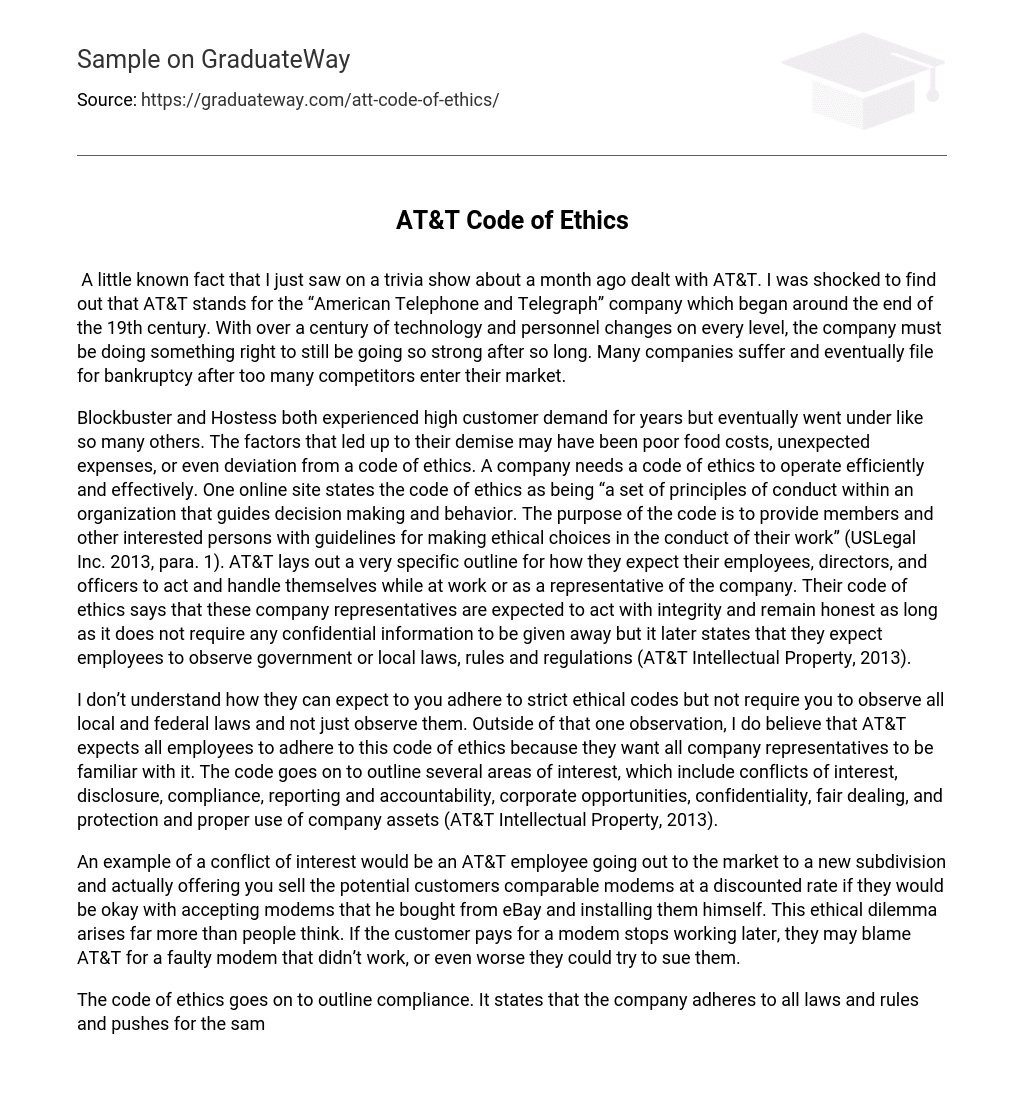Recently, I found out on a trivia show that AT&T, originally thought to be just a name, is actually an acronym for “American Telephone and Telegraph” company. Established in the late 19th century, this company has effectively adjusted to technological advancements and personnel changes over the years. It is remarkable how AT&T has maintained its strength and longevity in a continuously evolving market where numerous companies succumb to competition and eventually go bankrupt.
Both Blockbuster and Hostess encountered significant customer demand for several years but ultimately went bankrupt, along with many others. The reasons behind their downfall could include high food costs, unforeseen expenses, or even a departure from ethical standards. A company requires a code of ethics to operate efficiently and effectively. According to one website, a code of ethics refers to “a set of principles of conduct within an organization that guides decision making and behavior. The purpose of the code is to provide members and other interested persons with guidelines for making ethical choices in the conduct of their work” (USLegal Inc. 2013, para. 1). AT&T provides a detailed framework outlining their expectations for the behavior and conduct of their employees, directors, and officers while on the job or representing the company. Their code of ethics emphasizes the importance of acting with integrity and remaining truthful, unless it entails divulging confidential information. However, it also highlights the expectation for employees to comply with government or local laws, rules, and regulations (AT&T Intellectual Property, 2013).
AT&T expects employees to comply with both strict ethical codes and local and federal laws. However, it is unclear why they do not require employees to adhere to all laws, rather than just observe them. Despite this, AT&T does expect all employees to follow this code of ethics in order to ensure that all company representatives are familiar with it. The code covers a range of topics such as conflicts of interest, disclosure, compliance, reporting and accountability, corporate opportunities, confidentiality, fair dealing, and protection and proper use of company assets (AT&T Intellectual Property, 2013).
An example of a conflict of interest would be when an AT&T employee engages in unethical behavior by offering potential customers discounted modems that he purchased from eBay and installing them himself, while pretending they are comparable to new ones. This situation occurs more frequently than expected. In the event that the customer’s modem malfunctions after purchase, they may hold AT&T responsible for providing a faulty modem, which could potentially lead to legal actions against the company.
The code of ethics emphasizes compliance by stating that the company strictly follows all laws and rules and expects the same from its employees. However, it clarifies that any deviation is up to the discretion of the employee, and any consequences or penalties will be imposed solely on that employee (AT&T Intellectual Property, 2013). By highlighting this, the company communicates its expectations for employees to act in accordance with all legal requirements or protocols. Each individual is accountable for their own actions.
The company will protect themselves as much as possible if an employee steals items while at someone’s house. However, they emphasize that any actions taken by the employee are their own choice. I think this code of ethics aligns with the corporate values because it states that the company has a track record of succeeding through honest competition and does not engage in illegal or unethical practices (AT&T Intellectual Property, 2013, para. 19).
Looking back, I can honestly say that I have never seen an advertisement on TV where AT&T made fun of or belittled another competitor, in the same way that ALLTEL has done in their commercials for years. It was surprising to me that AT&T’s code of ethics did not mention anything about the company’s history and how their practices have earned them a reputation as a customer favorite and a trustworthy brand. In general, the company expects all employees and representatives to uphold various ethical values, as clearly outlined in their guidelines.
Having a code of ethics and effective communication throughout the company is crucial. Without these, the company might have faced closure, like many others, and potentially encountered multiple lawsuits.
References
- AT&T Intellectual Property. (2013). Corporate Governance.
- AT&T Code of Ethics. Retrieved from http://www.att.com/gen/investor-relations? pid=5595 USLegal, Inc. (2013).
- Code of ethics law and legal definition. Retrieved from http://definitions.uslegal.com/c/code-of-ethics/
- Carroll, J. “Cats and the seven deadly sins. ” San Francisco Chronicle. 2011, September 07: E10.





